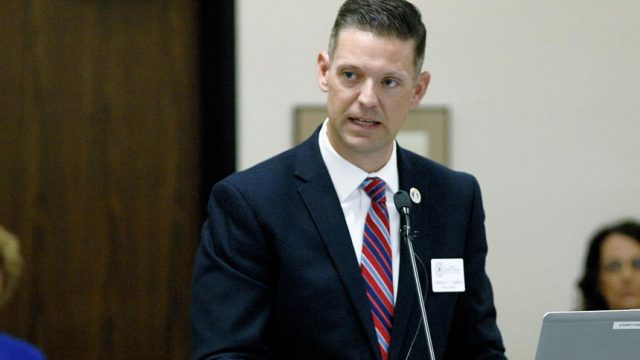Sean Foss: Lawmakers Can Tell the Auditor What to Do, but They Shouldn’t

State Auditor Josh Gallion presents his Governor's Travel and Use of State Resources report to members of the Legislative Audit and Fiscal Review Committee on Wednesday at the state Capitol in Bismarck. 6-27-2018
This guest post was submitted by Fargo attorney Sean Foss.
The recent dispute over the Legislature and Governor’s approval of restrictions on the State Auditor’s ability to perform performance audits has exposed numerous fault lines among our state’s leaders about who should have the ability to investigate and expose the potential misuse of public funds.
From my perspective, the State Auditor should have full autonomy to perform audits, whether regular or discretionary performance audits. It is difficult to see recent Senate Bill 2004 as anything but an attempt to shield sectors of our government from scrutiny, and I fully support the referendum campaign to overturn the amendments to laws regarding the State Auditor’s authority.
That said, the discourse over the issue has now shifted beyond the legal reality. In reading Rob Port’s post, “No Senator Wardner, the Legislature Is Not in Charge of the Auditor,” Rob made a good argument for why the State Auditor should be independent from the Legislature and other executive officers.
But Rob is simply wrong about the legal reality of the situation, and Senate Majority Leader Rich Wardner is right.
The North Dakota State Constitution clearly proscribes the Legislature with the right to establish and change the duties of the State Auditor, not to mention the other executive officers. Article V, Section 2 of the state constitution provides for the election of a State Auditor, but it also provides: “The powers and duties of the agriculture commission, attorney general, auditor, insurance commissioner, public service commissioners, secretary of state, superintendent of public instruction, tax commissioner, and treasurer must be prescribed by law.”
In short, while the state constitution calls for a State Auditor, it leaves the question of what the auditor is supposed to do up to the Legislature, who gets to prescribe the laws. The Legislature has done so, passing North Dakota Century Code Chapter 54-10, which outlines the specific powers and duties granted to the state auditor. Senate Bill 2004 amended N.D.C.C. § 54-10-01 (“Powers and duties of state auditor”) to restrict the auditor’s ability to perform performance audits by installing the Legislative audit and fiscal review committee as the gatekeeper.
As a political issue, I agree with Rob and many others that North Dakotans should not support allowing the Legislature to prevent the State Auditor, a duly elected official, from performing any performance audit the auditor deems appropriate. If the State Auditor abuses this power, the citizens can vote the auditor out. However, from a legal perspective, it is clear that under the North Dakota State Constitution as it currently stands, the Legislature is in fact the boss of the State Auditor (not to mention the Attorney General, Insurance Commissioner, Public Service Commissioners, Secretary of State, Superintendent of Public Instruction, Tax Commissioner, and Treasurer). The Legislature can expand or contract the job duties of these executive positions as it sees fit.
If anything, perhaps this situation will cause our state to take another looks at the separation of powers between the branches and to decide whether we have the proper balance.




